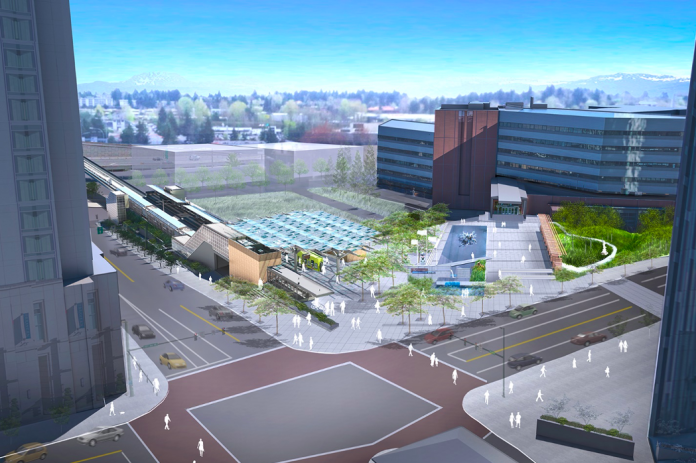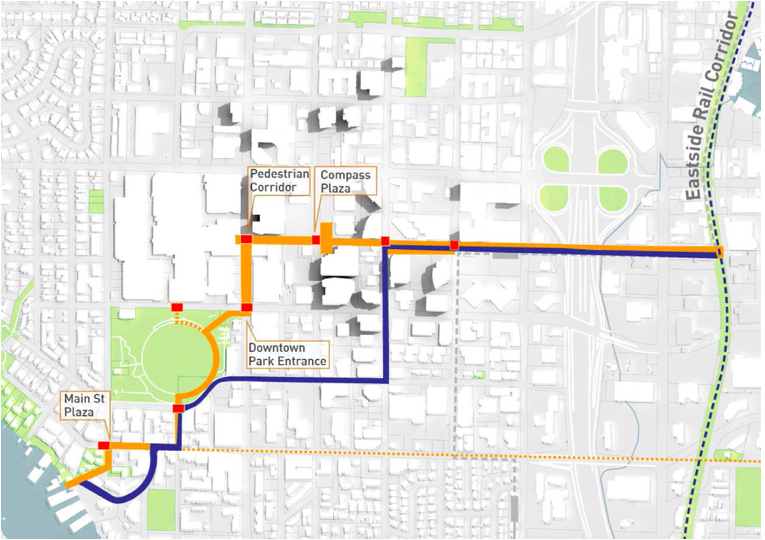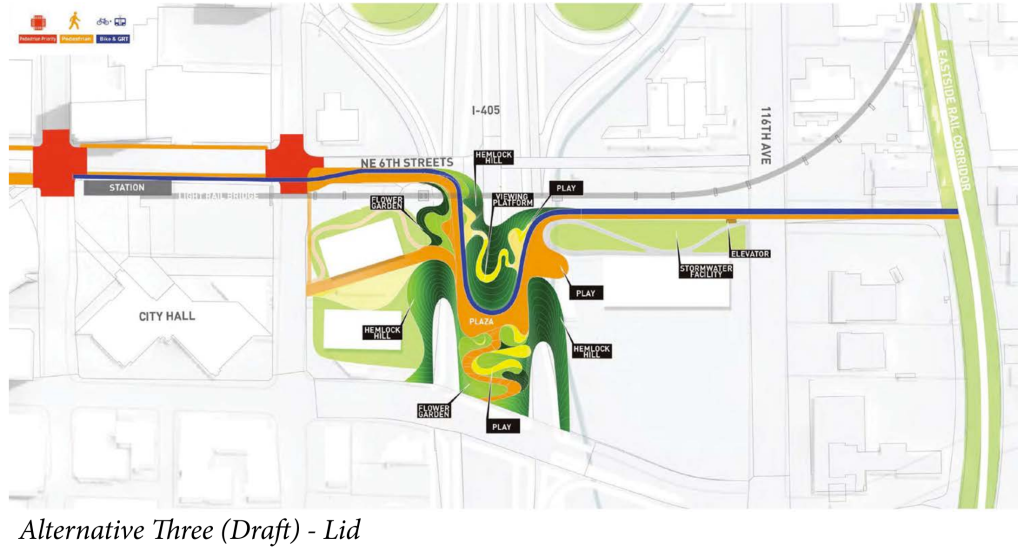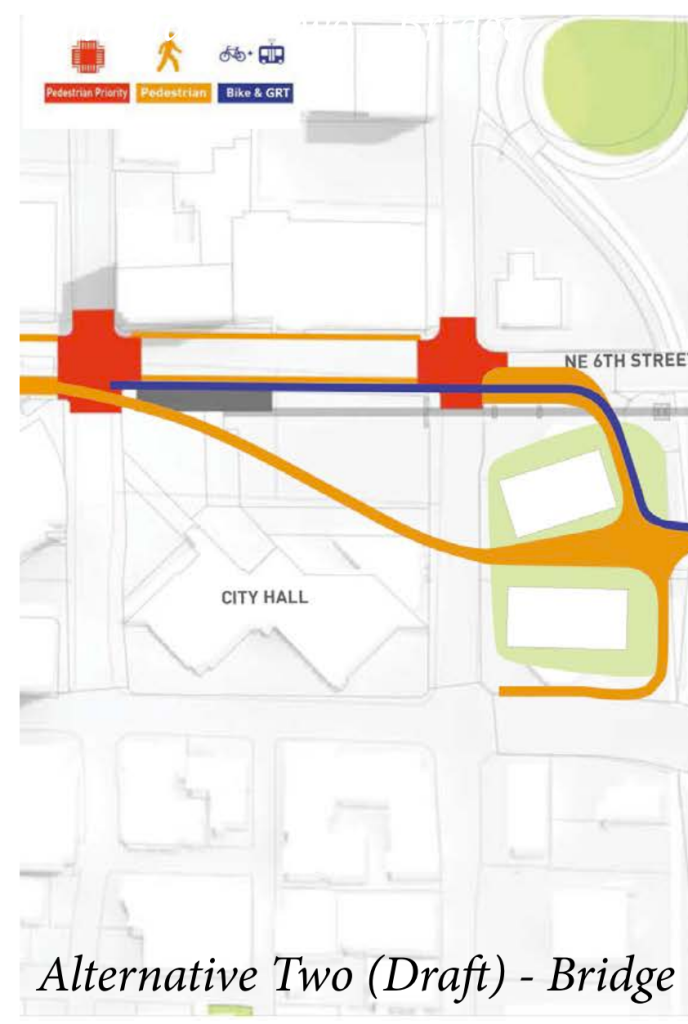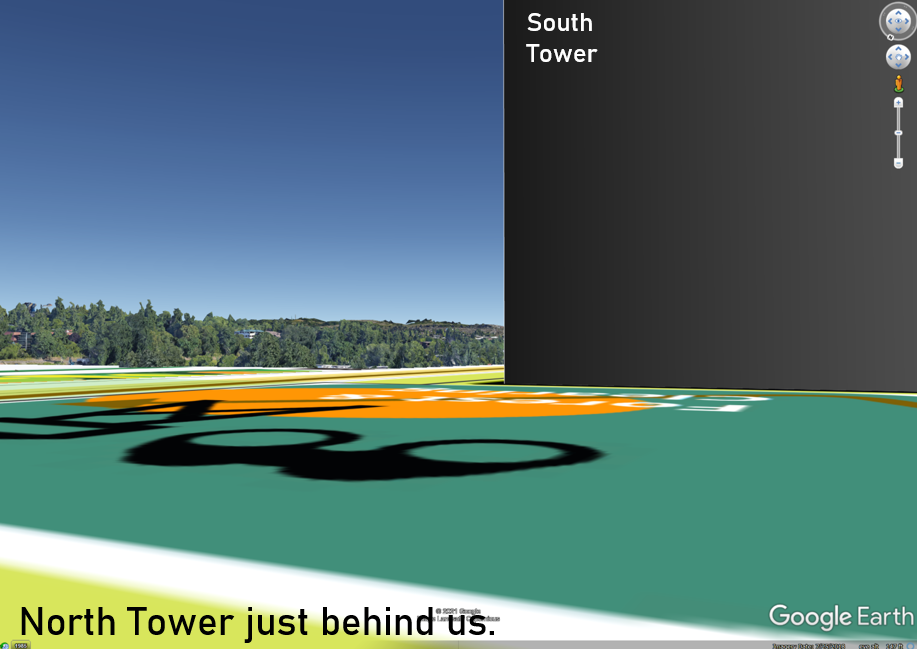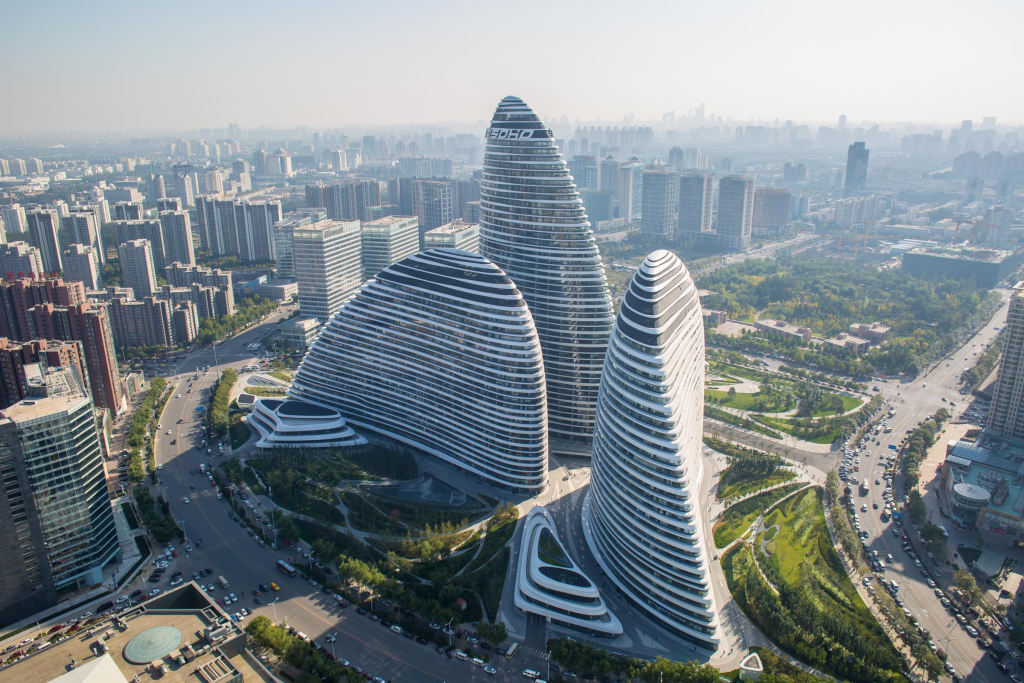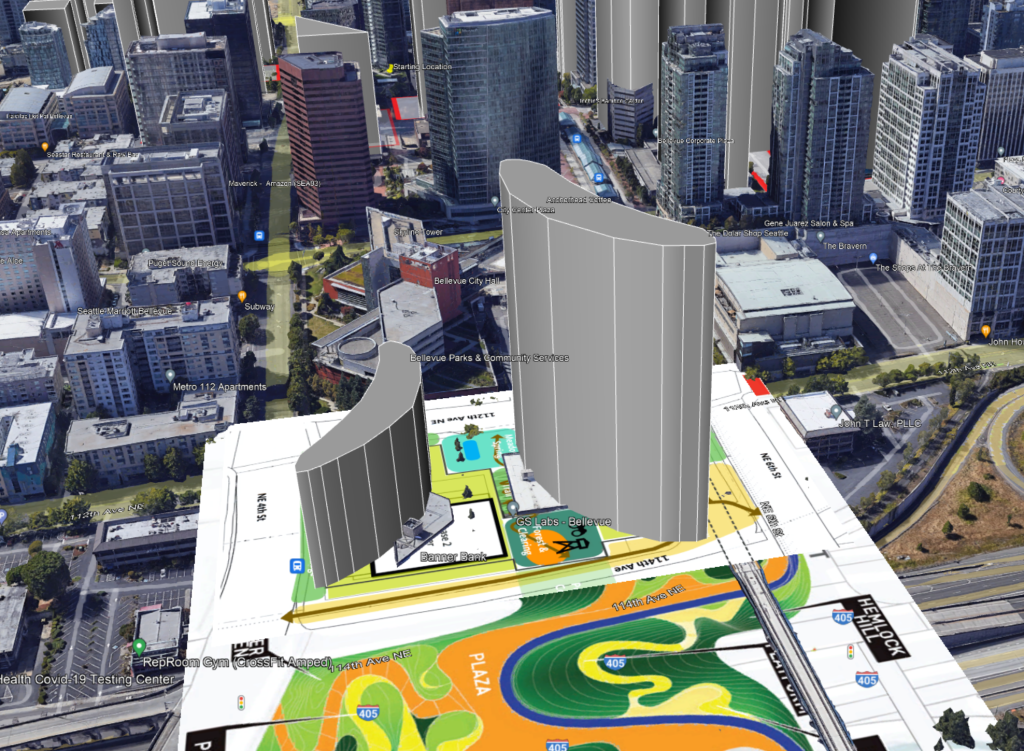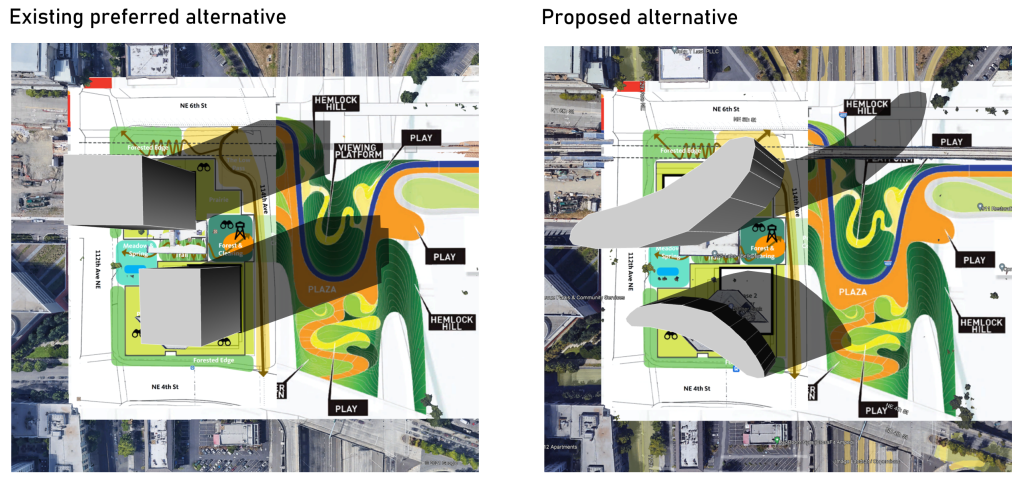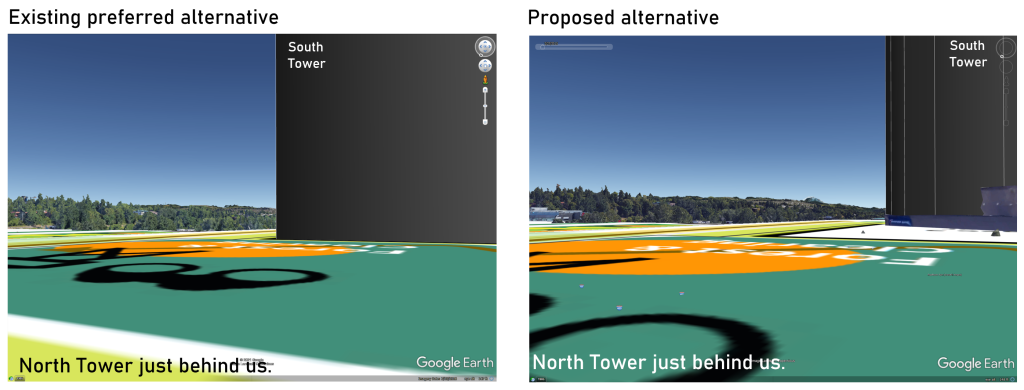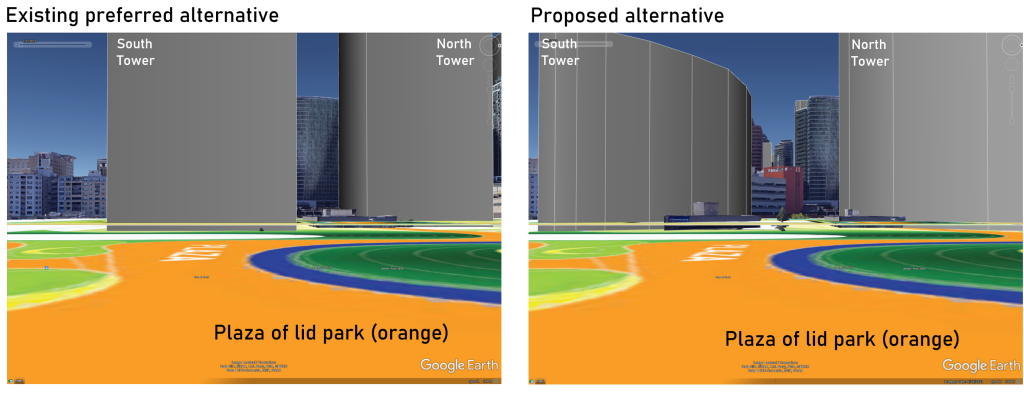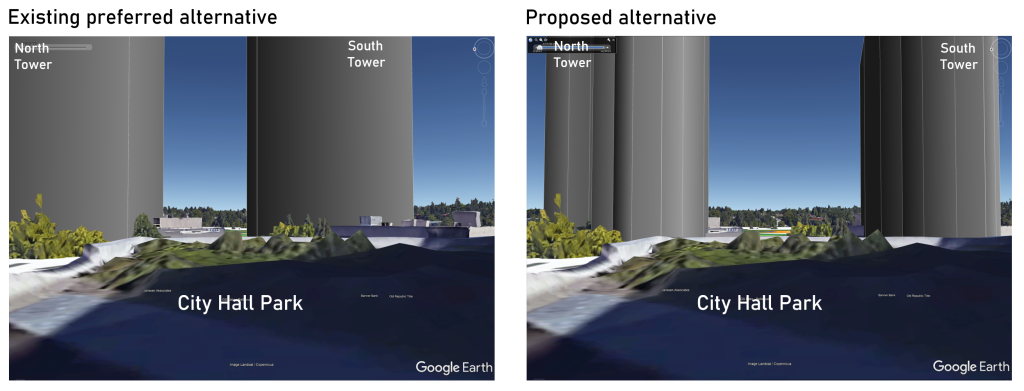This article is the final in a three-part series that takes a close look at Bellevue’s Grand Connection, a significant planning effort to make central Bellevue more accessible and vibrant for pedestrians. The series also proposes ideas for improvements that build on the current plan’s strengths. In Part 1, I examined the segment of the Grand Connection spanning from Meydenbauer Bay Park on Lake Washington through the Main Street shopping district, while Part 2 addresses the segment between the Downtown Park to the Bellevue Transit Center.
This final article addresses the last segment of the Grand Connection: Bellevue’s Downtown Link light rail station to the future lid park over Interstate 405.
NE 6th Street between 110th Avenue NE and 112th Avenue NE
This is the location of Link light rail’s Bellevue Downtown Station. The street is at a very steep grade while the station is level with about the middle of the block. The main entrance is accessed from the west by means of a set of escalators going down to the platform.
The rendering of the future station shows a park which is either level with the upper station plaza or one level below it. This makes sense when one considers that the lid over I-405 will be also elevated at close to the height of the light rail guideway (one level below the upper station plaza).
The ideal plan would be to create a series of parks, all at the same elevation, starting from 110th Avenue NE effectively all the way to 116th Avenue NE across the freeway. City Hall already has an elevated park to boot this effort, but this doesn’t appear to be quite what the Framework Plan alternatives are.
First, if we look at Alternative Three we can indeed see provisions for a park from about 112th Avenue NE to 116th Avenue NE. But for some reason, between 110th Avenue NE and 112th Avenue NE, next to the station, the Grand Connection follows the street. One of the major problems with such a design is that it would first lead people down a steep incline towards 112th, only to ask them to go back up again towards 114th for crossing the freeway on the lid. This is unfriendly towards people in wheelchairs, on bikes and frankly any pedestrian.
Alternative Two interestingly shows a pedestrian only connection going right through the City Hall lot, similar to what we would see if the elevated park from the LMN rendering above became reality:
So what we want to see here ideally is a combination of Alternative Two and Three. Going further, we can effectively have parks on the two blocks preceding the lid, all at the same elevation and connected via elevated crossings.
112th Avenue NE to 114th Avenue NE and Lid
Last, but not least, as can be seen from the two alternatives above, the parcel between 112th Avenue NE and 114th Avenue NE and NE 6th Street and NE 4th Street is slated for redevelopment — a project known as Bellevue Straits.
While private, this project is an extremely important piece of the public realm and the developer recognizes this in their design documents calling the site a “critical link in the Grand Connection masterplan and future I-405 Lid Park”.
Indeed the opportunity for creating three blocks of contiguous park space, as outlined in the previous point, is once in a generation and cannot be wasted.
Current state
The latest development plan for the site proposes two 400-foot towers and a narrow passage between them for the Grand Connection. Here I have overlaid the lid site plan with the Bellevue Straits site plan and a model of the towers:
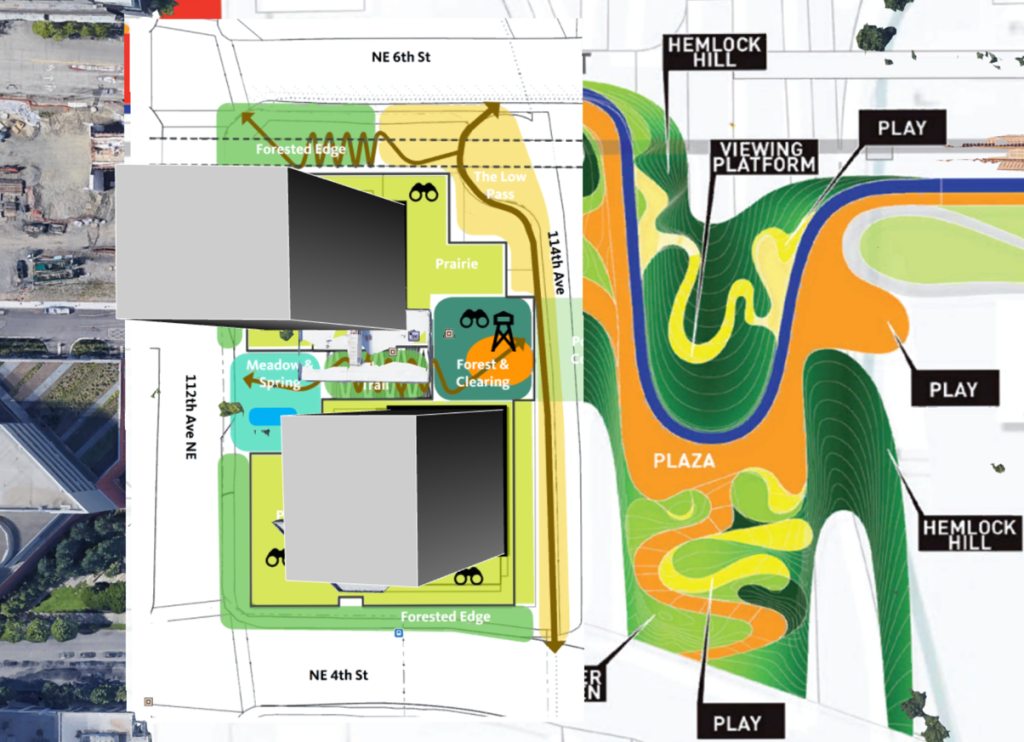
This project is still in early stages, the developer is open to proposals with regards to siting and we have a real opportunity to affect it.
Suggested improvements
First, let’s understand the problems we are trying to solve.
Problem 1: the current siting and massing of the towers blocks sunlight on the lid park in an unfavorable way. Per current plans, in the Summer at 3:00pm we expect shadows on much of the plaza and grassy sitting area. Combined with other negatives inherent to the lid park (freeway noise) this could reduce its attractiveness significantly. I know what you may be thinking — “Concerns about shadows? Really?” — don’t worry, there are smart solutions to the problem coming up.
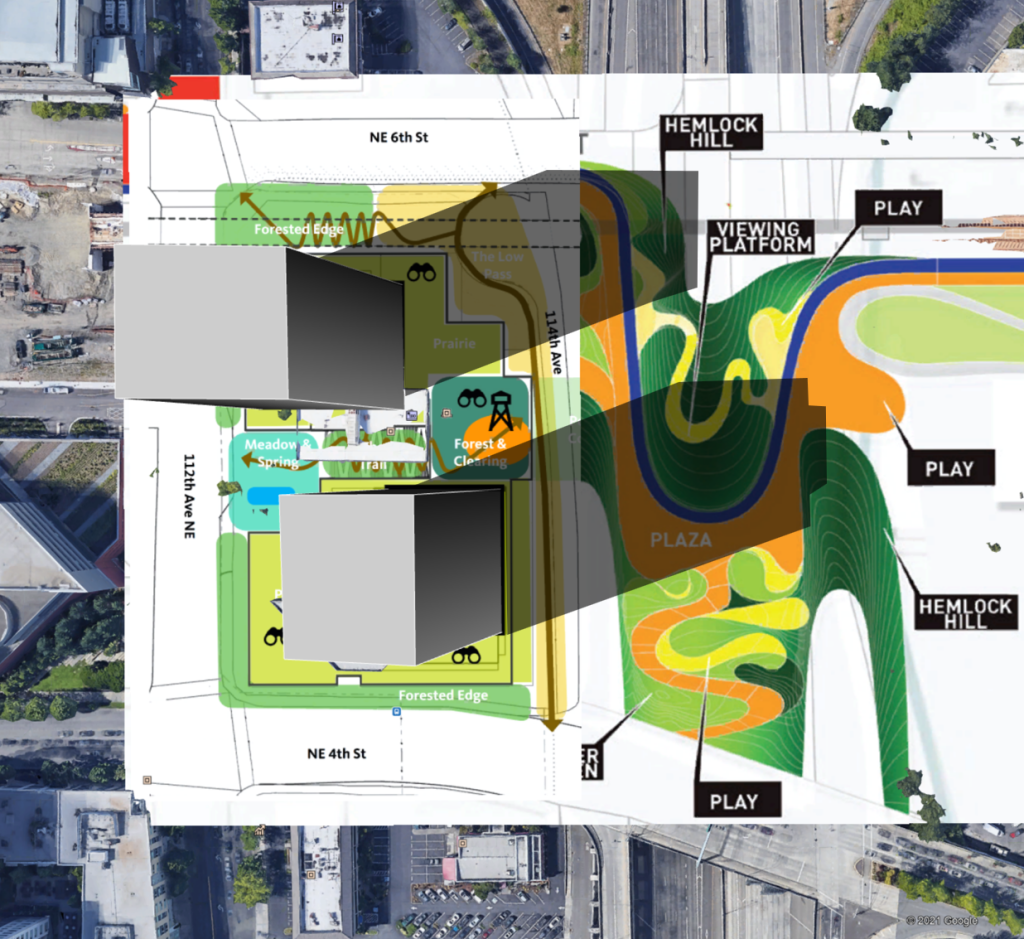
Problem 2: the area noted as “Forest & Clearing” where the plaza should have great views is severely hampered by the positioning of the South Tower. I really hope there will be some form of (small business) retail facing the plaza in the towers. Let’s imagine there is a coffee shop in the north tower, close to the area denoted by binoculars on the site plan. Let’s take a seat:
Wouldn’t it be nice if it were possible to see Mount Rainier from here — it’s just behind the South Tower?
Problem 3: the bulky tower designs proposed today have an imposing presence in any of the three blocks of park space. Given the developer’s recognition that this site is a “critical link”, and hiring Gensler as the new architect (which designed many iconic buildings like Shanghai Tower, for example), it’s unfortunate that the proposed designs still look as unremarkable as they do.
YIMBY Solutions
Now, I may talk about shadows, but I also recognize the importance of allowing development to proceed at the scale proposed by the market to avoid supply-driven price increases.
I spent some time wondering how to solve the problem without shrinking the project. It is possible — by shifting space from one tower to the other as they have different impacts on park shadows:
- Increase floorplates and height of the north tower
- Decrease floorplates and height of the south tower
Inspiration
To make it all visual I drew inspiration from Zaha Hadid’s marvelous Wangjing SOHO complex in Beijing:
The sculptural element of these towers also plays a key role in enhancing the public space — much more than two boring boxes ever would.
The following concept carefully situates the towers to maximize sunshine and views for users of the public spaces, while preserving the project gross floor area the same:
As mentioned, gross floor area within the project is completely preserved:

The north tower is 40 feet taller than previously which is a small variance the city should be able to approve.
The buildings face the public spaces in a form of reverse embrace and also frame the downtown skyline. So let’s see how the public realm is improved.
Benefits
Let’s see how things are different.
First, the park plaza, grassy knoll and viewing platforms are no longer covered in a shadow in the afternoon. In fact, most of the park remains shadow-free.
Second, the view from the “Forest & Clearing” area of the Bellevue Straits plaza is now much more open and it also provides a view of Mount Rainier:
Third, the experience from parks is also improved:
- There is no more a feeling of being boxed in by a tower right adjacent to the park since the two curvy towers create an opening towards downtown. Their facades are also just physically further from the park due to the curve.
- Furthermore, more of the downtown skyline is framed by the two towers rather than only a small sliver being visible.
And as already mentioned, the more sculptural architecture makes the towers an interesting fixture of the park, rather than boring boxes that make it feel smaller.
So, this is a significant departure from the existing project, but this is also an incredibly unique building site forming a gateway to downtown Bellevue.
Closing remarks
The Grand Connection is a vast project spanning over 20 regular-sized city blocks (about 10 Bellevue superblocks). And it cuts right through Bellevue’s most highly trafficked civic, recreation and retail areas. I can’t imagine another project that has more leverage on the future of the soul of the city.
There are many proposals here for which the time to act is now:
- 100th Avenue NE Meydenbauer Bay Park expansion before new development happens;
- Main Street flex zone for outdoor dining while pandemic is ongoing and need is great;
- NE 6th Street flex zones between Bellevue Way NE and 106th Avenue NE before new development prevents relocating the single parking access lane north or south;
- Three block elevated park from 112th Avenue NE to across the freeway before new development starts; and
- Maximizing the public benefit from the (expensive) Lid Park by ensure adjacent development happens, but does not impact it negatively.
As an ending note, I’d like to mention that pedestrian city centers in European cities leave a legacy for centuries and this could be no different. And for the business-minded, these are also often the highest-grossing retail areas too. So this is good for both the community and business. Let’s ensure we create this gift for generations to come.

Anton Babadjanov
Anton has been living in the Pacific Northwest since 2005 and in Seattle since 2011. While building technology products during the day, his passion for urban planning and transportation is no less and stems from a childhood of growing up in the urban core of a small European city.

